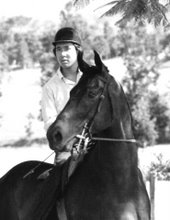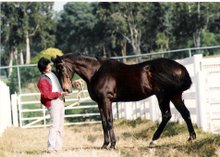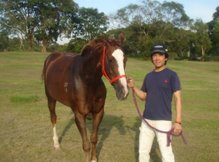
今期的主角要追遡到整整三十年前。閣下如記得 "威龍" 這匹馬 (不是幾年前由希斯訓練的那匹), 你肯定是位極為資深的馬迷。决定寫這匹馬有幾個原因。首先是因為我於 1982 至 1984 幾年的暑假裡經常策騎牠, 其次乃因牠是香港賽馬史上其中一幕另類經典的一位主角, 另外就是因為我後來曾一度是牠的馬主 "美國會所團體" 的成員之一。
 威龍於 1982 退役後由我的好友 Andrea Greco (其父為美國會所團體當時的那個混帳经理人 Don Greco) 在雙魚河繼續眷養作馬術用途。還記得那是 1982 年夏天的一個普通的下午, Andrea 問我可否代牠操練一匹馬; 我問她匹馬是怎樣的, 她只笑笑說: " 牠很活潑, 充滿生氣!" Andrea 是美國人, 但在香港住久了, 說起話來感染了英國人喜把意思藏在字句之間的作風, 因此上馬前我巳打醒十二分精神。果然一進沙圈, 威龍便下意識地不受約束及企圖擺脫控制, 我只能陰柔地及耐性地引導牠。待牠稍為安靜下來之後, 代之而起的是瀟洒的步姿及舒適無比的節奏。
威龍於 1982 退役後由我的好友 Andrea Greco (其父為美國會所團體當時的那個混帳经理人 Don Greco) 在雙魚河繼續眷養作馬術用途。還記得那是 1982 年夏天的一個普通的下午, Andrea 問我可否代牠操練一匹馬; 我問她匹馬是怎樣的, 她只笑笑說: " 牠很活潑, 充滿生氣!" Andrea 是美國人, 但在香港住久了, 說起話來感染了英國人喜把意思藏在字句之間的作風, 因此上馬前我巳打醒十二分精神。果然一進沙圈, 威龍便下意識地不受約束及企圖擺脫控制, 我只能陰柔地及耐性地引導牠。待牠稍為安靜下來之後, 代之而起的是瀟洒的步姿及舒適無比的節奏。
至此我頓然明白威龍的競賽成就及局限。牠體形偏細小, 體高僅15.1 掌, 但形格卻均衡對稱, 骨格強壯, 肌肉豐滿, 固此牠能在70 年代尾80 年代初的一、二班立下3 win 多位的戰功。但牠卻不幸地同時承受了過多純種馬百多年來因近親繁稙所產生的神經質元素 (exess nervous energy), 使牠的競賽成就未能更進一步。此外牠的個性亦異常倔強, 若牠不願意的話, 無論如向何訓練及誘導, 效果只得事倍功半。這亦解釋了為何大師如柏葛、繆沙等都拿牠沒辦法, 但卻在造詣極普通的牌仔莫理斯(練馬師卡法蘭的義子)袴下三奪頭馬。原因只有一個: 牠只願意受莫理斯駕馭! 盡管你柏葛神功蓋世、譽滿全球, 都只是世人對你的讚嘆, 在馬兒的眼中只和蹄下的泥屑無異, 不值一盼! 像威龍般個性的馬其實很少, 有緣遇到, 足以使你對馬匹的靈性有更深一層的體會。
 盡管拿牠设辦法, 但夥拍威龍串演一幕香港賽馬另類經典的正是柏葛。1979 年1 月 14 曰, 柏葛的威龍和畢奇的金碧鬥足全程, 一時間地動山搖, 英、法數百載宿怨彷似要一朝了斷! 最後50米竟出現兩大師傅 "格劍" 的鏡頭! 有說柏葛用手推開金碧的馬頭, 亦有說他用鞭擊打畢奇, 後者不忿還擊; 最後威龍僅以頭位見負, 而柏葛則被罰 5,000 大元 (約今日的數萬元)。騎師陣上格劍固然罕見, 但這幕之所以成為經典, 更多是因為史上最偉大的騎師在短短的十多秒鐘裡將他獨有的 Poetic License (詩人寫作時可不必遵照語文格式的常規, 寓意當人達到某超凡境界後無需依照常規的特權) 使用得淋漓盡致; 亦只有當時的柏葛有胆這樣做, 亦只有由柏葛來演譯, 我們才會在諒解之餘更報以難言的激賞! 而我當時因在美國求學而無緣目睹經過, 至今仍引為憾事。
盡管拿牠设辦法, 但夥拍威龍串演一幕香港賽馬另類經典的正是柏葛。1979 年1 月 14 曰, 柏葛的威龍和畢奇的金碧鬥足全程, 一時間地動山搖, 英、法數百載宿怨彷似要一朝了斷! 最後50米竟出現兩大師傅 "格劍" 的鏡頭! 有說柏葛用手推開金碧的馬頭, 亦有說他用鞭擊打畢奇, 後者不忿還擊; 最後威龍僅以頭位見負, 而柏葛則被罰 5,000 大元 (約今日的數萬元)。騎師陣上格劍固然罕見, 但這幕之所以成為經典, 更多是因為史上最偉大的騎師在短短的十多秒鐘裡將他獨有的 Poetic License (詩人寫作時可不必遵照語文格式的常規, 寓意當人達到某超凡境界後無需依照常規的特權) 使用得淋漓盡致; 亦只有當時的柏葛有胆這樣做, 亦只有由柏葛來演譯, 我們才會在諒解之餘更報以難言的激賞! 而我當時因在美國求學而無緣目睹經過, 至今仍引為憾事。威龍服役時為70年代尾80年代初祿怡老摩稱王的日子。那時雖然一切都沒有現時般先進, 既沒有大形的國際賽, 更加沒有香港自己的世界馬王, 但卻有重特別的色彩, 使之成為一個令人懷緬的時代: 現代化的進程冲擊著地道的賽馬文化, 所產生的火花不斷帶來驚喜和期待; 東渡的柏葛、畢奇、戴來、魏德禮、夏達等帶來的除了可媲美藝術家的功架, 還有他們個人的魅力。相對現下彌漫著的怨氣和無奈, 那時的馬圈可謂百花競放, 美不勝收! 不錯, 現今我們懂得談血统、講步速、論偏差、說國際化, 但卻偏偏缺少過去仿似小孩子走進玩具城時所感到的那股興奮與期待!
 隨著香港賽馬 80 至 90 年代的起飛, 威龍亦垂垂老矣。牠很幸運, 盡管牠的馬術成就有限加上自己的經濟情况欠隹, Andrea 對牠卻始終不离不棄, 細心照顧。威龍於 1993 年3月8 曰因腳患接受人道毀滅, 終年20 歲。據Andrea 說, 晚年的威龍仍不改其倔強本色, 直至最後一刻。
隨著香港賽馬 80 至 90 年代的起飛, 威龍亦垂垂老矣。牠很幸運, 盡管牠的馬術成就有限加上自己的經濟情况欠隹, Andrea 對牠卻始終不离不棄, 細心照顧。威龍於 1993 年3月8 曰因腳患接受人道毀滅, 終年20 歲。據Andrea 說, 晚年的威龍仍不改其倔強本色, 直至最後一刻。圖: 1) 威龍和金碧的经典一戰 (賽馬天下資料圖片)。 圖中可見柏葛 (紅帽) 眼角瞄向對手, 左手有所動作; 2) 威龍1982 十歲時年攝於雙魚河; 3) 2002 年 12 月在港宴請柏葛, 終得以和兒時的偶像会面, 卻因太興奮而忘了問他當年和畢奇一戰的細節。現年72 歲的柏葛曾於本月中因心臟不適在瑞士接受深切治療, 據聞巳無礙。我作為馬主最大的憾事之一, 就是柏葛巳退休, 使我的馬匹永遠無緣由其策騎出賽!
Everything about American Eagle surrounded his "alternate" outlook. From his temperament, personality, to his racing areer, the echoes of this word run deep and throughout.
I have decided to feature him as the subject of this issue firstly because I used to ride him very frequently during the summers of 1982 and 1983, and remember the experience very fondly. Another reason being he was at the centre of an alternate classic in Hong Kong's racing history. And finally because I later became a member of the American Club Racing Syndicate which had owned and raced him.
American Eagle, or Felix as he was fondly called by Andrea Greco who had him on livery since he retired in 1982, was merely described to me by her as being "lively" before I rode him for the first time. Although an American, years of living in colonial Hong Kong had given her the penchant to talk in typical British understatement. With this knowledge in mind I was cautious from the minute I hopped on Felix. My caution was well-founded, as Felix spooked and twisted and turned in almost every direction as soon as he was in the paddock. Settling him down required a mixture of firmess and finesse (and a good seat!), but when he did settle I was treated to one of the most beautiful set of gaits I can remember.
By then I understood why Felix's racing career panned out the way it did. Although he stood at only 15.1 hands, his had a well balanced conformation, supported by a solid and muscular frame. He had enough natural ability to land 3 winners and multiple placings in class 1 and class 2 company. But his natural ability was compromised by his excess nervous energy; and his headstrong personality did not help either, as he clearly had a mind of his own and only did what he wanted. This could possibly explain why he only went well with the modestly-talented claimer E Morris, while top class jockeys such as Lester Piggott and Joe Mercer could not make him budge. Horses like Felix are indeed rare, and the perspective into the psyche of such a horse is nothing less than fascinating.
.
Notwithstanding the fact that he would not budge with Lester Piggott, it was Piggott who partnered Felix in one of the most memorable alternate classics in Hong Kong Racing. January 17, 1979, Felix and Grasshopper Green duelled for most of the 1400m trip under a cloud of seeming Anglo-French rivalry. At the 200m mark something extraordiary was going on, as Piggot and French ace Phillipe Paquet appeared to be exchanging blows with their whips. Some said that Piggott pushed Grasshopper Green with his hand, others said that he whipped Paquet who retaliated in the same manner. In the end Felix went down by a head, and Piggott was fined $5,000 (about $50,000 in today's value). Piggott must have thought that he was merely exercising his poetic license. And rightly so! Since only Piggott could have had the audacity to do what he did, and only Piggott could have gotten away with it as the rest of the world could only watch in awe! (I was studying in America and most regretably did not witness this epic battle.)
.
Felix raced mostly in the mid-late 70s and early 80s. Those were the days of Silver Lining and the Moore clan. Although much less sophisticated and developed compared to the present day, there was a very special flavour to that era which makes one look back with nostalgia. Interaction between new ideas and local racing customs and culture brought endless surprises and eager anticipation; yearly migration of the likes of Piggott, Eddery, Paquet, Taylor, Mercer, and Hartack opened our eyes with their craft and charisma. In stark contrast to the ennui and resignation that cloud present day racing, it was an era that was overwhelmingly upbeat and energetic. That unsupressable "buzz" and precious enthusiasm could have been the price that we unknowingly paid for the sophistication and worldly acclaim that we have since gained.
As Hong Kong racing took off in the 80s and early 90s, Felix was growing old at Beas River. Despite his limitations in his equestrian role and the financial pressure she was facing herself, Andrea stuck with and looked after Felix until the end. He was a lucky horse. On 8 March 1993, not long after turning 20, he was put down due to chronic leg problems under an aging body. According to Andrea, he had never lost that mind of his own, down to the last minute.
As Hong Kong racing took off in the 80s and early 90s, Felix was growing old at Beas River. Despite his limitations in his equestrian role and the financial pressure she was facing herself, Andrea stuck with and looked after Felix until the end. He was a lucky horse. On 8 March 1993, not long after turning 20, he was put down due to chronic leg problems under an aging body. According to Andrea, he had never lost that mind of his own, down to the last minute.
.
Photos: 1) An alternate classic: Felix and Grasshopper Green 200m from the post (photo courtesy of Racing World Publication). Marking his opponent from the corner of his eye, Piggott's (red cap) left arm went to work; 2) Felix at 10 years, at Beas River circa summer 1983; 3) with Lester Piggott and mutual friend Harry Hiranand in Hong Kong, December 2003. Too excited at meeting my childhood idol, I forgot to ask Lester about the details of his epic battle with Philippe Paquet 24 years ago. Lester is now recovering from a heart discomfort earlier this month which placed him under intensive care in a Swiss hospital. As an owner, never having had Lester aboard my horses will forever remain a major regret.










 The summer went quickly, and I had to return to America for the new school semester. During the next 12 months while I was away, although I missed Money Talks a great deal, I did not know much about his life at Beas River, only that he was taken on livery by a British teenager named Christine Whithey. I did not know Christine personally, but I had seen her around Beas River a fair bit and knew she was a good rider. As such I at least felt reliefed that he was in good hands. When I returned the following summer I finally saw him again. He was rounder and heavier and in good physical condition. Although he seemed reasonably happy, I did feel that he was a bit tense. That could be due to insufficient exercise, lack of personal attention, or just the summer heat. I could only guess.
The summer went quickly, and I had to return to America for the new school semester. During the next 12 months while I was away, although I missed Money Talks a great deal, I did not know much about his life at Beas River, only that he was taken on livery by a British teenager named Christine Whithey. I did not know Christine personally, but I had seen her around Beas River a fair bit and knew she was a good rider. As such I at least felt reliefed that he was in good hands. When I returned the following summer I finally saw him again. He was rounder and heavier and in good physical condition. Although he seemed reasonably happy, I did feel that he was a bit tense. That could be due to insufficient exercise, lack of personal attention, or just the summer heat. I could only guess.




